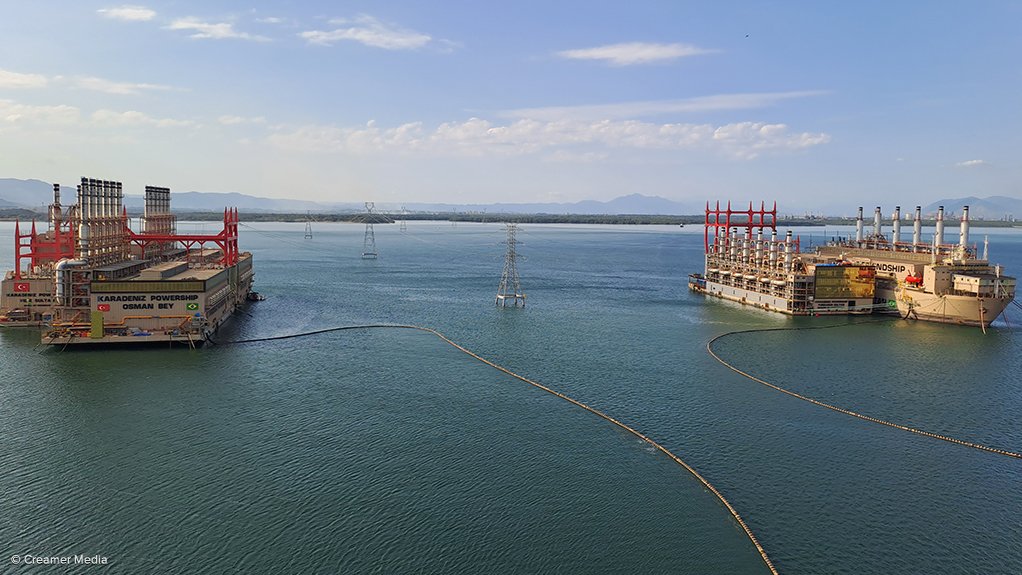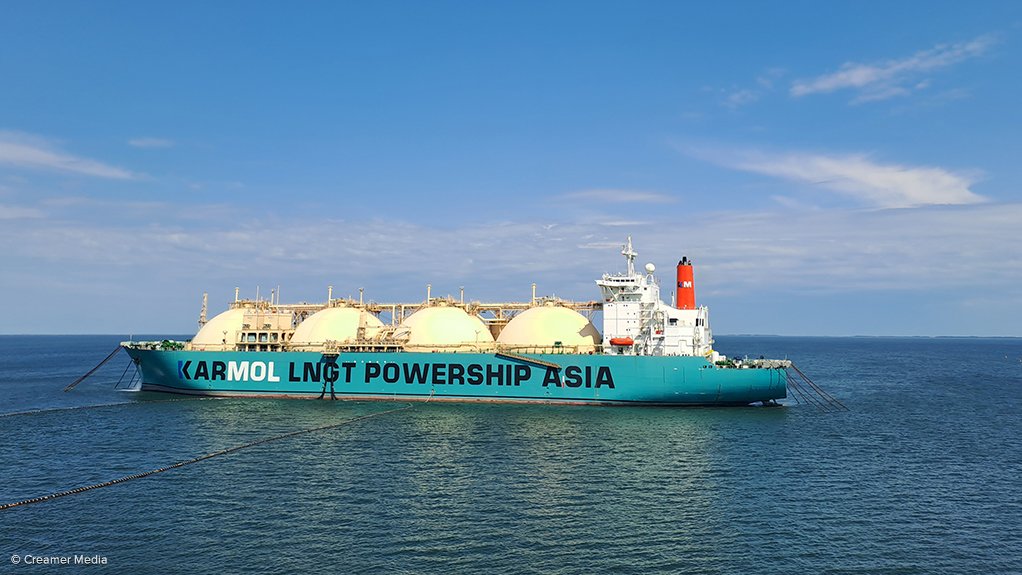Karpowership ‘very confident’ South African projects will proceed, open to shorter contract term



The powerships at the Brazil project
Photo by Creamer Media's Tasneem Bulbulia
The floating storage regasification unit in Brazil
Photo by Creamer Media's Tasneem Bulbulia
Turkish energy company Karpowership, which has been seeking to implement three ship-based power projects in South Africa after being named one of the preferred bidders in the government’s Risk Mitigation Independent Power Producer Procurement Programme (RMIPPPP), is “very confident” that the projects will proceed, despite prolonged regulatory setbacks.
“It has been two years of going through all these processes and the only remaining licence to get are the environmental licences,” Karpowership South Africa and regional director Mehmet Katmer said during a visit to one of the company’s current projects in Rio de Janeiro, Brazil, last week.
Following the completion of public participation processes and the submission of a report, the Department of Forestry, Fisheries and the Environment will make a determination, and if favourable, the company expects the environmental licences for all three projects to be secured within months.
This is the third time Karpowership is undertaking public participation processes and the second time it is submitting environmental applications, having failed to meet the requirements previously. This has raised questions as to why the projects have not been disqualified, as well as why Eskom has agreed to reserve scarce grid resources for the powerships amid a clamour for grid access.
Should the company prevail in securing its environmental authorisations, Katmer expressed confidence that the projects could be delivered within 12 months of achieving financial close.
He said the company would hold talks with the Department of Mineral Resources and Energy’s (DMRE's) Independent Power Producers Office and the relevant government authorities to see if it can fast-track this.
From an asset delivery perspective, the powerships are ready in Istanbul and Singapore, and can be delivered in less than a month. The longest lead item is the transmission line and the gas pipeline, and if these can be fast-tracked as well, the projects could be implemented before the end of next year, Katmer claimed.
PROJECTS BREAKDOWN
Karpowership is aiming to undertake the floating gas-to-power projects at the ports of Richards Bay, Saldanha Bay and Ngqura, using imported liquified natural gas (LNG) as a fuel source.
Powerships are ship- or barge-mounted, fully integrated floating power plants.
The Richards Bay project would entail a 450 MW devoted capacity project, which would require the company to deliver two powerships and a floating storage regasification unit (FSRU), build a gas pipeline between the FSRU and powership, build a transmission line from the powership to the substations and undertake certain marine works to moor the ships.
Coega would be a similar undertaking, albeit with a shorter transmission line.
Saldanha would be a 320 MW project and would, therefore, require only one powership and an FSRU. This project would also be located further offshore in the port, compared with the other two.
In total, this would provide 1.2 GW of capacity, enough to bring the country down one stage of loadshedding, Katmer highlighted.
Moreover, he said Karpowership’s energy availability factor (EAF) in the 19 countries it operates in averages 95%, making the solution suitable to help close the gap that has arisen as a result of the decline in the coal-fleet EAF, while reducing reliance on the diesel-fuelled open-cycle gas turbines (OCGTs).
He stated that this would benefit Eskom financially, as the South African power utility is spending billions of rands a year on running the OCGTs in order to lower the stages of loadshedding it has to implement. Katmer claimed the LNG-to-power solution would cost half that of the diesel costs incurred by Eskom.
He also said that the projects were not being pursued in preference to renewable energy generators, and would play a modest part in the country’s energy mix, at about 2%.
“In order to retire the coal fleet, you need to invest in gigawatts of renewables. To make renewables work, when the sun and wind is not available, you need to have dispatchable power. This is what our LNG-to-power solution is – it is complementary.
“South Africa needs this solution, as there is no other company in the world that could deploy 1.2 GW in less than a year. Secondly, if you want to build renewable energy capacity, you need to have flexible gas generation in your mix. Lastly, it is extremely competitive at these prices, and also reduces the diesel spending,” Katmer posited.
ENVIRONMENTAL
Nevertheless, Karpowership has faced strong criticism and opposition in the country, with environmental groups objecting to the implementation of another expensive fossil-based solution and near-port communities groups saying its powerships will negatively impact on small-scale fishing and marine life.
“For any project of this size, and when there is a new technology involved, it is quite normal that you will get certain opposition, and we have faced our fair share of these over the past two years. The challenges we face are owing to the novelty of this solution, as well as it being the first time an LNG import is coming into the country.
“The country is trying to move away from coal and invest in renewables, which I think is the right thing to do. However, to make those renewables work, you need to have these LNG-to-power projects as well,” Katmer asserted.
He said Karpowership had managed to secure environmental approvals globally for its projects and said there were no negative impacts.
During the Brazil visit, the company pointed out that it undertakes regular testing, including on water quality, underwater noise, emissions and on marine fauna and flora.
Katmer said that, while there will be emissions, Karpowership would contribute to an improvement in the country’s baseline emissions, as LNG emissions are half that of coal and 30% lower than diesel emissions.
CONTRACT LENGTH
Another qualm with the project has been the 20-year contract length, with critics questioning why the country should be tied to an “emergency” solution for so long.
However, Katmer explained that the tender the company participated in was for a 20-year project; therefore, this length of contract is a requirement set by the South African State and not Karpowership.
The RMIPPPP, launched in 2020, was aimed at procuring 2 000 MW of additional power within 12 to 18 months. Few of the RMIPPPP projects have, however, reached financial close.
Katmer pointed out that the tender was technology agnostic and required delivery of a solution in 12 months, making it an ideal fit for the company’s business model.
“We had a very economically compelling offer to win this,” Katmer added.
He said that, because the projects were awarded through a tender process under the auspices of the Independent Power Producer Procurement Programme, any term discussions or change in the requirements would be a formal process that the DMRE would have to initiate.
Karpowership has, therefore, not entered into any formal discussions for a shorter-term contract, but Katmer said the company would be open to doing so if required.
Electricity Minister Dr Kgosientsho Ramogopka has insisted that the contract period should be no longer than five years, but has not yet clarified how government intends shortening the term.
Because Karpowership owns the assets, Katmer indicated that it could easily agree to a shorter term, noting that it had varying contract lengths globally.
Discussions would, therefore, centre on new terms and conditions, financial costs and the extent of time changes.
Katmer also highlighted the job creation element of the projects in South Africa, with jobs in the short term to come from construction activities and some marine work. In the longer-term operational period, Karpowership will directly employ 1 248 people at the three sites.
He added that the indirect employment, which comes from the LNG and all of the services around the FSRUs, will see this employment figure increase tenfold; and that jobs will be highly skilled, for which the company will set up a training centre.
Karpowership is also undertaking solar farm and reforestation projects in Brazil, as complementary to its project there.
Katmer indicated that the company would undertake similar efforts in South Africa, in addition to its economic development obligations.
*Tasneem Bulbulia was a guest of Karpowership during site visits to its operations in Rio de Janeiro, Brazil.
Article Enquiry
Email Article
Save Article
Feedback
To advertise email advertising@creamermedia.co.za or click here
Press Office
Announcements
What's On
Subscribe to improve your user experience...
Option 1 (equivalent of R125 a month):
Receive a weekly copy of Creamer Media's Engineering News & Mining Weekly magazine
(print copy for those in South Africa and e-magazine for those outside of South Africa)
Receive daily email newsletters
Access to full search results
Access archive of magazine back copies
Access to Projects in Progress
Access to ONE Research Report of your choice in PDF format
Option 2 (equivalent of R375 a month):
All benefits from Option 1
PLUS
Access to Creamer Media's Research Channel Africa for ALL Research Reports, in PDF format, on various industrial and mining sectors
including Electricity; Water; Energy Transition; Hydrogen; Roads, Rail and Ports; Coal; Gold; Platinum; Battery Metals; etc.
Already a subscriber?
Forgotten your password?
Receive weekly copy of Creamer Media's Engineering News & Mining Weekly magazine (print copy for those in South Africa and e-magazine for those outside of South Africa)
➕
Recieve daily email newsletters
➕
Access to full search results
➕
Access archive of magazine back copies
➕
Access to Projects in Progress
➕
Access to ONE Research Report of your choice in PDF format
RESEARCH CHANNEL AFRICA
R4500 (equivalent of R375 a month)
SUBSCRIBEAll benefits from Option 1
➕
Access to Creamer Media's Research Channel Africa for ALL Research Reports on various industrial and mining sectors, in PDF format, including on:
Electricity
➕
Water
➕
Energy Transition
➕
Hydrogen
➕
Roads, Rail and Ports
➕
Coal
➕
Gold
➕
Platinum
➕
Battery Metals
➕
etc.
Receive all benefits from Option 1 or Option 2 delivered to numerous people at your company
➕
Multiple User names and Passwords for simultaneous log-ins
➕
Intranet integration access to all in your organisation


















